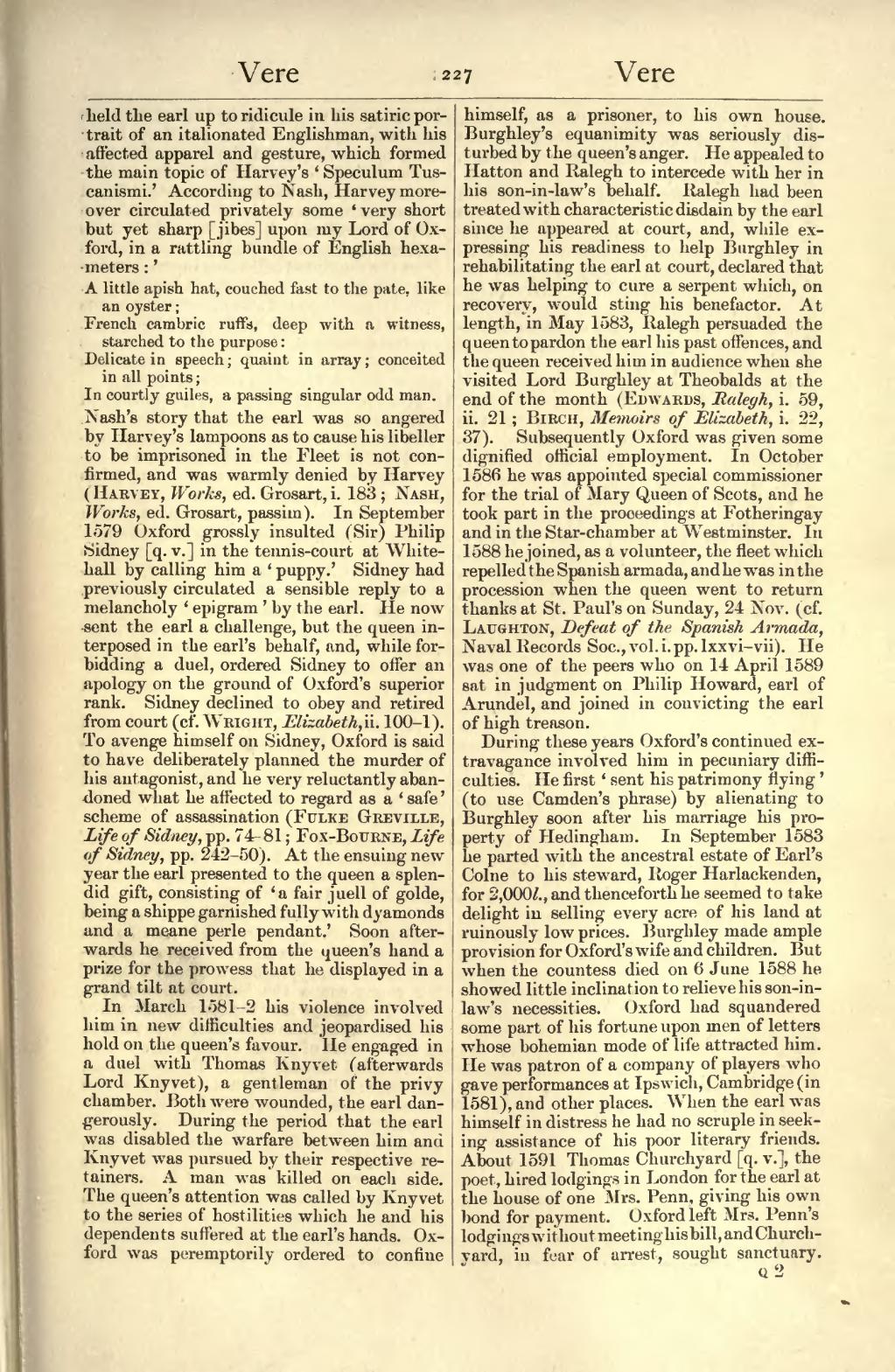held the earl up to ridicule in his satiric portrait of an italionated Englishman, with his affected apparel and gesture, which formed the main topic of Harvey's ‘Speculum Tuscanismi.’ According to Nash, Harvey moreover circulated privately some ‘very short but yet sharp [jibes] upon my Lord of Oxford, in a rattling bundle of English hexameters:’
A little apish hat, couched fast to the pate, like an oyster;
French cambric ruffs, deep with a witness, starched to the purpose:
Delicate in speech; quaint in array; conceited in all points;
In courtly guiles, a passing singular odd man.
Nash's story that the earl was so angered by Harvey's lampoons as to cause his libeller to be imprisoned in the Fleet is not confirmed, and was warmly denied by Harvey (Harvey, Works, ed. Grosart, i. 183; Nash, Works, ed. Grosart, passim). In September 1579 Oxford grossly insulted (Sir) Philip Sidney [q. v.] in the tennis-court at Whitehall by calling him a ‘puppy.’ Sidney had previously circulated a sensible reply to a melancholy ‘epigram’ by the earl. He now sent the earl a challenge, but the queen interposed in the earl's behalf, and, while forbidding a duel, ordered Sidney to offer an apology on the ground of Oxford's superior rank. Sidney declined to obey and retired from court (cf. Wright, Elizabeth, ii. 100–1). To avenge himself on Sidney, Oxford is said to have deliberately planned the murder of his antagonist, and he very reluctantly abandoned what he affected to regard as a ‘safe’ scheme of assassination (Fulke Grevillw, Life of Sidney, pp. 74–81; Fox-Bourne, Life of Sidney, pp. 242–50). At the ensuing new year the earl presented to the queen a splendid gift, consisting of ‘a fair juell of golde, being a shippe garnished fully with dyamonds and a meane perle pendant.’ Soon afterwards he received from the queen's hand a prize for the prowess that he displayed in a grand tilt at court.
In March 1581–2 his violence involved him in new difficulties and jeopardised his hold on the queen's favour. He engaged in a duel with Thomas Knyvet (afterwards Lord Knyvet), a gentleman of the privy chamber. Both were wounded, the earl dangerously. During the period that the earl was disabled the warfare between him and Knyvet was pursued by their respective retainers. A man was killed on each side. The queen's attention was called by Knyvet to the series of hostilities which he and his dependents suffered at the earl's hands. Oxford was peremptorily ordered to confine himself, as a prisoner, to his own house. Burghley's equanimity was seriously disturbed by the queen's anger. He appealed to Hatton and Ralegh to intercede with her in his son-in-law's behalf. Ralegh had been treated with characteristic disdain by the earl since he appeared at court, and, while expressing his readiness to help Burghley in rehabilitating the earl at court, declared that he was helping to cure a serpent which, on recovery, would sting his benefactor. At length, in May 1583, Ralegh persuaded the queen to pardon the earl his past offences, and the queen received him in audience when she visited Lord Burghley at Theobalds at the end of the month (Edwards, Ralegh, i. 59, ii. 21; Birch, Memoirs of Elizabeth, i. 22, 37). Subsequently Oxford was given some dignified official employment. In October 1586 he was appointed special commissioner for the trial of Mary Queen of Scots, and he took part in the proceedings at Fotheringay and in the Star-chamber at Westminster. In 1588 he joined, as a volunteer, the fleet which repelled the Spanish armada, and he was in the procession when the queen went to return thanks at St. Paul's on Sunday, 24 Nov. (cf. Laughton, Defeat of the Spanish Armada, Naval Records Soc., vol. i. pp. lxxvi–vii). He was one of the peers who on 14 April 1589 sat in judgment on Philip Howard, earl of Arundel, and joined in convicting the earl of high treason.
During these years Oxford's continued extravagance involved him in pecuniary difficulties. He first ‘sent his patrimony flying’ (to use Camden's phrase) by alienating to Burghley soon after his marriage his property of Hedingham. In September 1583 he parted with the ancestral estate of Earl's Colne to his steward, Roger Harlackenden, for 2,000l., and thenceforth he seemed to take delight in selling every acre of his land at ruinously low prices. Burghley made ample provision for Oxford's wife and children. But when the countess died on 6 June 1588 he showed little inclination to relieve his son-in-law's necessities. Oxford had squandered some part of his fortune upon men of letters whose bohemian mode of life attracted him. He was patron of a company of players who gave performances at Ipswich, Cambridge (in 1581), and other places. When the earl was himself in distress he had no scruple in seeking assistance of his poor literary friends. About 1591 Thomas Churchyard [q. v.], the poet, hired lodgings in London for the earl at the house of one Mrs. Penn, giving his own bond for payment. Oxford left Mrs. Penn's lodgings without meeting his bill, and Churchyard, in fear of arrest, sought sanctuary.
